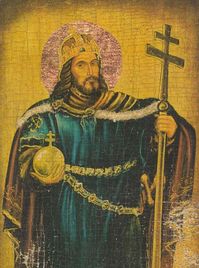
He passed almost whole nights in earnest prayer, and when totally rapt in the thought of heavenly things, he sometimes became beside himself, and was seen to rise off the ground into the air. In more than one instance he strangely escaped through the power of prayer from rebellion, treason, and the onslaughts of mighty foes. He married Gisela of Bavaria, sister to the holy Emperor Henry, and begat on her Emeric, whom he trained up in such manners and godliness, as are shown by his also becoming a Saint. To carry on the business of his kingdom, he gathered together from all quarters the most learned and godly men, and took nothing in hand without their advice. Meanwhile he entreated of God by the most lowly supplications, offered up in sack-cloth and ashes, that, before he departed this life, he might see all Hungary Catholic. On account of his excellent zeal for the spread of the Faith he is called the Apostle of that nation, and the Bishop of Rome gave to him and to his successors the right to have a Cross carried before them.
He had a burning zeal to honour the Mother of God. He built a very great Church in her honour, and made her Patroness of Hungary. In return, the same Virgin received him into heaven, upon the day of her own Assumption, which the Hungarians, by the example of the Holy King, call the Great Lady's Day. His hallowed body yielded the sweetest savour, and reeked with an heavenly liquid, and amid many and divers wonders it was removed by command of the Bishop of Rome into a more noble place, and more honourably buried. Pope Innocent XI ordered his Feast to be held upon the 2nd day of September, on account of the famous victory over the Turks which was gained upon this day, when the army of Leopold I, Emperor elect of the Romans, and King of Hungary, wrested from them, by the help of God, the city of Buda.




